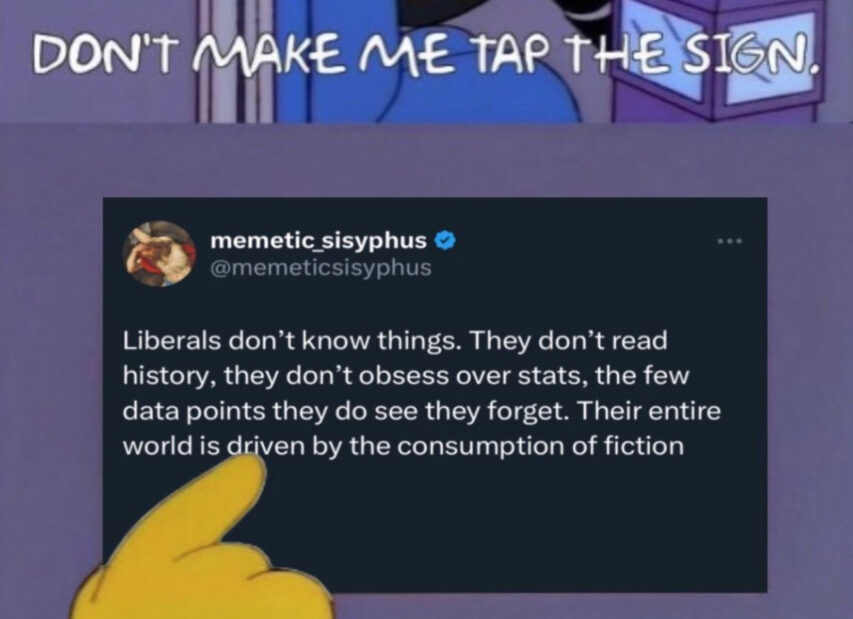Adrian Goldsworthy. Historian and Novelist
Published 18 Sept 2024Continuing series looking at the HBO/BBC co production drama series ROME. We will look at how they chose to tell the story, at what they changed and where they stuck closer to the history.
April 10, 2025
HBO’s Rome – Ep 5 “The Ram has touched the wall” – History and Story
April 6, 2025
March 28, 2025
Mistaking popular fiction for real life
At Postcards from Barsoom, John Carter recounts an odd but revealing experience with a young progressive entity:
Some years ago I was provided a fascinating psychological experience in the form of a young graduate student in the English literature program, whom I encountered because they (you heard me) was (God that’s grammatically awkward) married to a colleague. She (I’m not doing this anymore) specialized in the study of propaganda, by which of course she meant everything her backwards conservative parents in Nowhere, Nebrahoma believed, and not anything she believed. One evening, after enthusiastically explaining the symbolism of the inverted pentagram tattooed on her shoulder, she informed me with invincible confidence that not only was gender an arbitrary social construction, but that even the idea of biological sex was nothing more than convention. Her reasoning, which I presume she’d gleaned from a seminar on radically liberatory queer theory, was that testosterone levels fluctuated during the day, so “males” changed their degree of “maleness” all the time, and how can something that’s constantly changing be used as the basis for a hard binary distinction?
“But that’s not how biological sex is defined,” I replied. “Testosterone is just a hormone. It’s only present in vertebrates. Insects don’t have it, and neither do plants, but they still have biological sex. Sex is defined according to whether an organism produces mobile gametes or sessile gametes, which is basically universal across multicellular life forms.”
“I don’t understand what that means,” she chirped, still thinking we were playing language games. “Like I don’t know what a ‘sessile gamete’ is.”
“Oh,” I responded helpfully, “A gamete is just a reproductive cell. Sessile means it doesn’t move. So –”
The horrible reality of what I was saying dawned upon her. “I just realized that this isn’t a conversation I should be having,” she cut me off, and walked away.
It was remarkable. The mindworm parasitizing her consciousness had detected a threat to its structural integrity, and ordered its host to remove herself from the interaction before she consumed a malinformative infohazard. She didn’t even pretend that this wasn’t what she was doing. I’d never before seen something quite like it.
There’s a long-standing joke that liberals don’t know things, that their entire worldview seems to be formed by the ersatz experiences of visual entertainment. When they discuss the war in Ukraine, they express it in terms of Marvel comic book movies or Star Wars; when thinking of President Trump, in terms of Harry Potter. Black people are all wise and benevolent and great dancers because this is what Fresh Prince and Morgan Freeman told them; white men are all inbred stupid Klansmen because of Mississippi Burning and Roots; girls are just as strong as boys (stronger, actually) because Black Widow kicks butt; and so on. Even their favourite point of historical reference – World War Two, the Nazis, Hitler – seems to be almost entirely a palimpsest of Steven Spielberg movies like Saving Private Ryan and Schindler’s List.
It isn’t just that they use fictional references as metaphors or allusions. That’s a very human thing to do, and the right is certainly no stranger to Tolkien analogies. But liberals seem to do this a lot, with only the most tenuous connection back to reality. Their inner world is a series of self-referential fantasies. The right uses fictional references as metaphors to explain facts; the left substitutes fictional metaphors for facts, and then forgets that it does this.
The recent Netflix drama Adolescence is a striking case in point. It portrays the fictional story of a 13-year-old white boy who stabs a female classmate to death because his brain was twisted into a pretzel by exposure to the incel subculture over social media. Following its premier, the British government has been using it to gin up a moral panic, with calls to censor social media to tackle the urgent problem of toxic masculinity.
March 15, 2025
Firefly – We Didn’t Know How Good We Had It
The Critical Drinker
Published 14 Mar 2025It was overlooked in its own time, never finding the audience it deserved, but Firefly has gone on to become a cult classic with the most dedicated on fanbases. And now that I’ve finally arrived to the party 20 years late, I wanted to share my thoughts on Joss Whedon’s Firefly.
March 14, 2025
Firefly and the Lost Cause
Feral Historian
Published 8 Nov 2024I’ve often been questioned for making Civil War comparisons when discussing Firefly. Here I explain why Firefly not only reflects but is based on the Lost Cause mythology of the Confederacy.
For further background on how secession was framed at the start of the American Civil War, battlefields.org has plain text copies of several of the Confederate States’ declarations of causes for secession up at https://www.battlefields.org/learn/pr…. You can see how slavery is mentioned a lot, but often framed in terms of the second-order effects of Northern policy damaging their economy, infringing on sovereignty, etc. It varied by state of course, Virginia kept it vague with references to the Federal government “perverting said powers” granted it, while Mississippi was very clear about slavery being the cause.
00:00 Intro
01:12 The Lost Cause
03:27 Selling the Peace
05:28 Causes
06:59 Firefly as a Lost Cause
March 10, 2025
Rome (2004): HBO’s Untold 5 Season Story
Little Wars TV
Published 6 Sept 2024HBO’s Rome is one of the greatest television shows ever made, but the premium network infamously cancelled Rome after just two seasons. It is a decision HBO executives later admitted was a mistake. In this video essay, we explore why HBO cancelled Rome and what the showrunners envisioned as the full, five-season story arc. Which characters were meant to survive? What historical storylines would have been explored? And what was the show’s final scene supposed to be at the end of five seasons?
We’ll unearth interviews with Bruno Heller and William J MacDonald, hear from actors like Kevin McKidd, and attempt to piece together a vision of Rome‘s full potential if HBO had not cancelled the show prematurely.
(more…)
March 2, 2025
“We’re saying words that we’re told to say. We’re told how to say them. We’re told where to stand. And then we’re telling people how to vote?”
As a natural follow-on to yesterday’s post about Celebrity fatigue, here’s Kat Rosenfield in The Free Press hoping that we can somehow make actors apolitical again:

During the Vietnam War, actress Jane Fonda visited North Vietnam and expressed strong support for the regime’s struggle against the United States and South Vietnam.
If I have to listen to an actor talk about politics, let that actor be Gabriel Basso.
You might know Basso from his breakout role in Netflix’s hit series The Night Agent, in which he stars as an FBI agent who works in a secret basement office beneath the White House. But Basso has another White House connection. In 2020, he played J.D. Vance in the big-screen adaptation of Hillbilly Elegy, which was based on the vice president’s memoir about his childhood in Appalachia — which means we now live in a world where the vice president could be Netflix-and-chilling in the White House, watching the man who once played his own younger self doing espionage in the basement of the building he’s sitting in.
In a recent interview, Basso called his entanglement with Vance’s timeline “kind of weird”, which it is — but what’s weirder is that Basso describes Vance himself as “a cool dude”, as if he’s talking about some guy in his Wednesday night bowling league as opposed to one of the most powerful and polarizing political figures in the United States.
This type of comment is typical for Basso, who doesn’t believe actors should embroil themselves in politics. “We’re saying words that we’re told to say. We’re told how to say them. We’re told where to stand. And then we’re telling people how to vote?” he said on a recent episode of the Great Company podcast. “You should be quiet; you should do your job. You should be a jester, entertain people — then shut the fuck up.”
To hear an actor talk like this is especially remarkable in the middle of awards season, when the great and the good of Hollywood use the red carpet as a pulpit to preach their politics, which are reliably blue. Last Sunday, at the Screen Actors Guild Awards, Jane Fonda used her acceptance speech for the Life Achievement Award to rally the crowd to the right side of history. “Make no mistake, empathy is not weak or woke,” she declared. “And by the way, woke just means you give a damn about other people!”
[…]
The entanglement of Hollywood and Washington only intensified in the final weeks of the 2024 election cycle — which included, among other things, a political ad voiced by Julia Roberts, a Democratic National Committee headlined by Oprah Winfrey, and the Avengers literally assembling to campaign for Kamala Harris. The bitter irony, of course, is that despite the entire Hollywood apparatus coming out in support of Harris, all we got was a Trump landslide and the absolutely dire image of a bunch of our favorite actors wearing “White Dudes for Harris” T-shirts.
It’s enough to make you long for the golden age when it was the norm for actors to, as Basso so artfully put it, “shut the fuck up”.
February 22, 2025
February 21, 2025
Firefly and the End of Serenity
Feral Historian
Published 29 Mar 2023Serenity did an admirable job of wrapping up Firefly after the series was cancelled. But the ending, which depends on the idea that exposing government misdeeds forces change, doesn’t work today. Serenity‘s ending is premised on the idea that “sunshine is the best disinfectant” but the last few years have illustrated that we’re dealing with sunlight-resistant corruption these days.
00:00 Intro
00:24 Backstory
01:27 Chimerica
02:08 Unification
03:37 Secrets
05:12 Serenity‘s Ending
February 19, 2025
HBO’s Rome – Ep 4 “Stealing from Saturn” – History and Story
Adrian Goldsworthy. Historian and Novelist
Published 28 Aug 2024Vidcaps taken from the dvd collection and copyright belongs to the respective makers and channels.
Transcript
February 14, 2025
Trump may start paying attention to Canadian cultural protectionist polices next
Michael Geist points out just how many Canadian federal policies and programs will likely come under scrutiny by the Trump administration for their blatant protectionism against US cultural products:
My Globe and Mail op-ed argues the need for change is particularly true for Canadian digital and cultural policy. Parliamentary prorogation ended efforts at privacy, cybersecurity and AI reforms and U.S. pressure has thrown the future of a series of mandated payments – digital service taxes, streaming payments and news media contributions – into doubt. But the Trump tariff escalation, which now extends to steel and aluminum as well as the prospect of reviving the original tariff plan in a matter of weeks, signals something far bigger that may ultimately render current Canadian digital and cultural policy unrecognizable.
Our cultural frameworks are largely based on decades-old policies premised on marketplace protections and mandated support payments. This included foreign ownership restrictions in the cultural sector and requirements that broadcasters contribute a portion of their revenues to support Canadian content production.
As we moved from an analog to digital world, the government simply extended those policies to the digital realm. But with Mr. Trump appearing to call out what he views to be Canadian protectionist policies in sensitive sectors such as banking ownership, the cultural and digital sectors may be next.
If so, there are no shortage of long-standing policies that tilt the playing field in favour of Canadians that could spark some uncomfortable conversations.
Why do U.S. companies face ownership restrictions in the telecom and broadcast sectors? Why are Canadian broadcasters permitted to block U.S. television signals in order to capture increased advertising revenue? Why do Canadian content rules exclude U.S. companies from owning productions featuring predominantly Canadian talent?
The Canadian response that this is how it has always been is unlikely to persuade Mr. Trump.
Canadian policies premised on “making web giants pay” may also be non-starters under Mr. Trump. For the past five years, the Canadian government seemingly welcomed the opportunity to sabre rattle with U.S. internet companies. This led to mandated payments for streaming services to support Canadian film, television and music production; link taxes that targeted Meta and Google to help Canadian news outlets; and the multibillion-dollar retroactive digital services tax that is primarily aimed at U.S. tech giants.
Not only have those policies raised consumer affordability and marketplace competition concerns, they have also emerged as increasingly contentious trade issues. If the trade battles with the U.S. continue, the pressure to scale back the policies will mount.
Beyond rethinking established cultural and digital policies both new and old, the bigger changes may come from re-evaluating the competitive impact of policies that rely heavily on regulation just as the U.S. prioritizes economic growth through deregulation. Proposed Canadian privacy, online harms and AI rules have all relied heavily on increased regulation, looking to Europe as the model.
For example, consider the Canadian approach to AI regulation in the now-defunct Artificial Intelligence and Data Act. It specifically referenced the European Union’s regulatory system, which establishes extensive regulatory requirements for high-risk AI systems and bans some AI systems altogether.
However, the European approach is not the only game in town. Mr. Trump moved swiftly to cancel the former Biden administration’s executive order on AI regulation, signalling that the U.S. will prioritize deregulation in pursuit of global AI leadership. Further, the arrival of DeepSeek, the Chinese answer to ChatGPT, took the world by storm and served notice that U.S. AI dominance is by no means guaranteed.
The competing approaches – U.S.-style lightweight regulation that favours economic growth against a more robust European regulatory model that emphasizes AI guardrails and public protections – will force difficult policy choices that Canada has thus far avoided.
January 29, 2025
Canadians – “polite lunatics”
In The Line, Mitch Heimpel talks about a Canadian culture from a time before a Canadian PM could get away with maligning the country as having “no core identity”:
In recent days, The Line has spoken of the need for Canada to go “full psycho”. To “Make ‘Canada’s back’ a threat”. And, specifically, to recapture a Canadian identity that was, not long ago, widely shared — Canadians as scary and even dangerous. My own mind had been on similar topics of late, and I’d been thinking, specifically, about how those representations used to show up not just in our pop culture, but in American pop culture.
And in at least one place, you can find it still: Shoresy, a hilarious comedy show about Canadian hockey hosers that has found success on both sides of the border.
Shoresy is interesting not because it’s new, but almost because it’s retro. Once upon a time, the kind of Canadian identity shown in Shoresy was just … Canadian identity. Here’s a great example of what I mean that I suspect many readers will have seen: 1968’s The Devil’s Brigade, a film about the First Special Service Force, a joint Canadian-American unit that would become the forerunner to the American Green Berets. The film is a remarkable reflection of the attitudes that the two cultures had about each other. In one particular scene, after the Americans (predominantly tough guy actors Claude Akins and James Coburn) have spent days making sport of the Canadians, a new Canadian sergeant — played by Jeremy Slate — is introduced in a mess hall scene. Mild-mannered, lithe, and even bespectacled, the Sergeant sits down next to Akins and begins to insult him. He starts by literally elbowing the American bully for room at the table in the Mess and proceeds to call him a fat tub of lard.
Once Akins has had enough, he attacks the Canadian sergeant, who reveals himself to be the unit’s new hand-to-hand combat instructor, and proceeds to pummel Akins while barely smudging his glasses. After having bruised the American’s body, as well as his ego, he returns to dinner and punctuates it by asking Akins for the salt. Akins hands it over.
This was not a remarkable representation. The Americans used to view us as polite lunatics. This showed up not just in American media, but also our stories about ourselves. Characters like Slate’s sergeant Patrick O’Neill showed up in the songs of Stompin’ Tom, Ian Tyson, and even Gordon Lightfoot. They’re memorialized in the works of Robert Service and Al Purdy. Purdy, in particular, describes this archetype well, both in At the Quinte Hotel and in The Country North of Belleville:
backbreaking days
in the sun and rain
when realization seeps slow in the mind
without grandeur or self-deception in
noble struggle
of being a fool –A country of quiescence and still distance
a lean land
not like the fat south.In those few lines, Purdy captures Canadiana so easily. A people shaped by distance and the harshness of the land. Capable of the toughness needed to endure. With just a little foolishness mixed in for good measure.
Polite lunatics.
January 25, 2025
QotD: “Big budget cuts!”
So why is there such a big disconnect in the media? Why are there headlines about cutting and slashing when government is growing by every possible measure?
For the simple reason that the budget process in Washington is pervasively dishonest, as I’ve explained in interviews with John Stossel and Judge Napolitano. Here are the three things you need to know.
- The politicians created a system that automatically assumes big increases in annual spending, called a baseline.
- When there’s a proposal to have spending grow slower than the baseline, the gap between the proposal and the baseline is called a cut.
- It’s like being on a diet and claiming progress because you’re gaining two pounds each month rather than five pounds.
Defenders of this system argue that programs should get built-in increases because of things such as inflation, or because of more old people, which leads to more spending for programs such as Social Security and Medicare.
It’s certainly reasonable for them to argue that budgets should increase for these reasons.
But they should be honest. Be forthright and assert that “Spending should climb X percent because …”
Needless to say, that won’t happen. The pro-spending politicians and interest groups like the current approach because it allows them to scare voters by warning about “savage” and “draconian” spending cuts.
Daniel J. Mitchell, “The Media’s Pervasively Dishonest Coverage of Trump’s New Budget”, International Liberty, 2020-02-10.
January 24, 2025
QotD: Star Trek‘s transporter
Some great men are born great, some achieve greatness, and some have great catchphrases said to them. James Doohan is an honorary member of that last category. He was the guy who spent four decades on the receiving end of the request to “Beam me up, Scotty” – if not on TV, where no character on Star Trek ever actually uttered the words, at least in real life, where fans would cheerfully bark the injunction across crowded airport concourses in distant lands, and rush-hour freeway drivers would lurch across four lanes of traffic to yell it out the window at him. Elvis is said to have greeted him with the phrase, and Groucho, too. There are novels with the title, and cocktails. On Highway 375 to Roswell, New Mexico, you can stop at the Little A-Le-Inn and wash down your Alien Burger with a Beam Me Up, Scotty (Jim Beam, 7 Up and Scotch).
It wasn’t supposed to be the catchphrase from the show: that honor was reserved for Gene Roddenberry’s portentous sonorous orotund grandiosity – the space-the-final-frontier-boldly-going-where-no-man’s-gone-before stuff. The beaming was neither here nor there: it was a colloquialism for matter-energy transit, or teleportation – or, more to the point, a way of getting from the inside of the space ship to the set of the planet without having to do a lot of expensive exterior shots in which you’ve got to show the USS Enterprise landing and Kirk, Spock et al disembarking. Instead, the crew positioned themselves in what looked vaguely like a top-of-the-line shower, ordered Scotty to make with the beaming, and next thing you know they were standing next to some polystyrene rocks in front of a backcloth whose colors were the only way of telling this week’s planet from last week’s. “Beaming” was the special effect – the one that saved Star Trek from having to have any others.
Mark Steyn, “Beam Movie Actor”, Steyn Online, 2020-02-15.
January 19, 2025
Mark Carney is a serious man … that doesn’t mean he’d be a good political leader
The Line‘s Jen Gerson likes Mark Carney, but she hastens to add that this isn’t necessarily good news for Mr. Carney as she felt the same way about Jim Prentice who was very briefly Premier of Alberta but “demonstrated the political nous of a chicken nugget” and quickly was out of power:

Then-Governor of the Bank of Canada Mark Carney at the 2012 Annual Meeting of the World Economic Forum in Davos, Switzerland.
WEF photo via Wikimedia Commons.
I learned the most valuable lesson from that period of political reporting, one I try to carry with me unto this very day: Never, never let one’s personal feelings about an individual candidate corrupt one’s political analysis. And if you think about it, this is a very important lesson to learn.
I am not a normal person. That which appeals to me is very unlikely to find purchase with sane, feeling voters who hold ordinary jobs and live lives filled with meaningful human connections and real, not-political conversations.
I was thinking about this as I watched Mark Carney announce his intention to run as Liberal leader in Edmonton on Thursday. Carney is a serious man. He has a real CV and a long list of meaningful accomplishments. He’s a man who seems to understand that the “good old times are over”. He’s a man who has navigated several international crises — as he was keen to point out. He’s a man who despises the excesses of both the right and the left. He’s a man who is is focused on building Canada’s economy.
He’s a man who has correctly identified one of the Conservatives’ core weaknesses, their tendency to channel legitimate anger and grievance into thin slogans that offer few substantive plans toward the kinds of significant changes that this country will be required to make. The fact that Carney is making this critique while coming to the fore without offering any substantive plans of his own is only to be expected considering the timeline’s he’s working with, I suppose.
Regardless, Carney is giving Jim Prentice Energy. Jean Charest Energy. Jeb! Energy.
I like him.
[…]
For that matter, if Carney wants to present himself as a strong supporter of Canada, a defender of our sovereignty in the face of America’s re-articulated expansionist ambitions, why did he preempt his leadership launch with an appearance on The Daily Show? What message are we to take from this: that Carney is well liked and respected by the American political milieu that was roundly trounced by Donald Trump?
It doesn’t signal a lot of faith in Canada as a cohesive cultural concept to soft launch your political leadership campaign through a marshmallow chat with an American comedy host. (As an aside, I realize that foreigners aren’t real to Americans, but I’m begging literally any television journalist on a mainstream U.S. network to stop treating our politicians like kawaii pets [Wiki] on loan from a northern Democrat utopia that exists only in their minds. These people can handle hard questions — even about matters that are important to an American audience; like, for example, Canada’s delinquent NATO spending.)
Did Mark Carney not believe that the CBC that I presume he will be campaigning to preserve was up to the challenge of doing the first interview with him? Look, I wouldn’t turn down a chat at Jon Stewart’s table if I got the call, but if the best possible way to reach potential Liberal leadership voters in 2025 is to pop onto American TV, we might as well pack it in, call ourselves 51 and be done with it.
By the way, in case anyone hasn’t yet pointed it out; the average age of a Daily Show audience member is 63. The audience is in steep decline, and it doesn’t even air on any Canadian TV channels anymore. To watch the Carney clip, Canadians have to seek it out on Apple TV or YouTube. Usually the day after because the target demo is usually in bed by 9 p.m. MST now.








